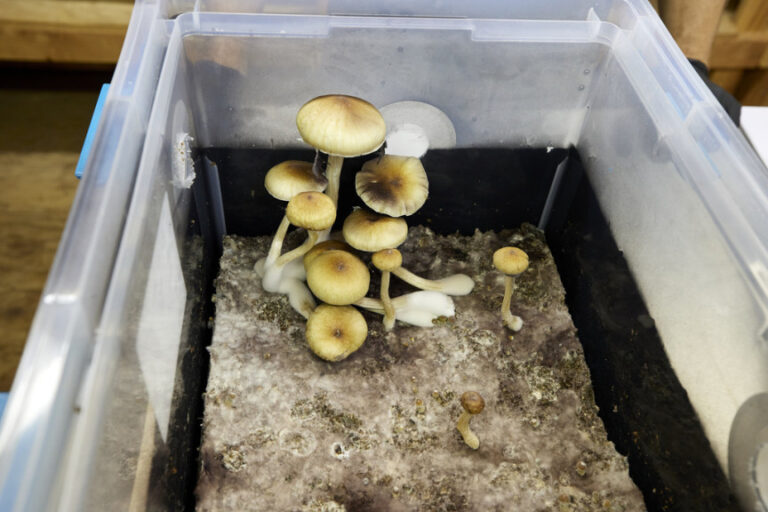After graduating from high school, Justin Wigg said he craved adventure, which led him to serve in the Marine Corps for five years during the Iraq war.
His adjustment to his life back in the United States, he said, was not easy. He was deployed to Iraq twice, and when he returned home, his friends all had college stories, while he had war stories.
“[I] was kind of thrown into the chaos of what we call civilian life,” said Wigg, who now lives in Lombard. “There’s a lot of safety nets that the military provides you that, all of a sudden, you’ve got to figure that stuff out on your own.”
Wigg said he developed a strong sense of community during his time in the Marines — and not having that support back home was tough.
“I think the lack of shared experience — not finding a lot of people that can relate to what you have been doing with the last five years of your life — was a challenge,” Wigg said.
Wigg said he struggled with anger and depression, and antidepressants didn’t seem to help and had negative side effects.
It’s why he began exploring plant-based medicines, including psychedelic drugs, Wiggsaid, and why he supports a bill working its way through the legislature in Illinois that would open up access to psilocybin for supervised adult use.
“It’s natural, it’s there for a reason,” Wigg said. “If we need to write law in order to prevent people from going to jail and getting the help they need, that’s what we need to do.”
Clinical trials for psilocybin are ongoing, but the drug has already shown promise for the treatment of certain mental health conditions. The bill — SB 3695 — would allow adults 21 and older who meet certain criteria to use psilocybin in a supervised setting with licensed facilitators.
Illinois State Sen. Rachel Ventura (D-43), the bill’s lead sponsor, says the legislation is modeled after similar laws in Oregon and Colorado — the first two states to legalize and decriminalize psilocybin.
“I think by and large, most people feel this is a very powerful medicine that allows them to explore things that they wouldn’t normally in a very conscious setting… and come away with a very positive experience,” Ventura said. “So the regulation is really meant to [ensure] that is the type of results that we are seeing.”
The difference psychedelics can make
Wigg said his perspective on plant medicine changed after he tried cannabis and found it helped him manage his mental health symptoms. It’s why he decided to travel to Peru for an Ayahuasca retreat, which consists of rituals and ceremonies where participants consume psychedelic brews.
Wigg said he resonates with an analogy coined by Robin Carhart-Harris, a psychedelics researcher, that compares the mind to a ski slope. The shift he felt in his mindset before and after treatment felt like a fresh coat of snow.
“It’s… like a ski hill. Your brain gets these patterns ingrained in it. It might not be the best way to do it, but it’s the only way that you’ve figured out how to do it,” he said. “After a dose or a treatment, it’s like a fresh snowfall, and it covers all those tracks and gives you an opportunity to handle situations differently than you have in the past and to just look at things with kind of a fresh perspective and a fresh set of eyes.”
The idea that the brain can be rewired this way is backed by science. Dr. Joshua Woolley, a psychiatrist from UC San Francisco, studies how psilocybin, coupled with psychotherapy, can be used to treat depression.
He’s never met Wigg, but he said many of the participants in his research studies have had similar experiences.
There’s still a lot we don’t know about psilocybin and which mental health conditions it is most effective in treating. But the research is promising.
The hypothesis, Dr, Woolley said, is that psilocybin increases the plasticity of the brain, meaning people can start to feel unstuck from their former ways of thinking.
“There is this idea that that’s how these drugs are working in humans; that they might be inducing a plastic state, a state where change is more possible than usual,” Dr. Woolley said.
Another potential benefit of psychedelic therapy is that its effects last longer.
“People can get huge improvements in their mental health… We and others have shown big improvements in depression,” Dr. Woolley said. “Unlike antidepressants like SSRIs, you know, Prozac, we’re talking about a single dose of this drug, and then people feel better for weeks to months.”
Efforts are underway to fast-track access to psilocybin in Illinois
Illinois is one of many states considering legislation that would decriminalize psilocybin and make it legal for adult use. “A lot of other states are saying, ‘Well, if this is going to help people, we really want to utilize that here in our state,’” Ventura said.
Psilocybin may not be the best treatment for everyone, which Ventura said is why the bill includes regulations for supervised treatment centers. Not only do facilitators need to be licensed before they can administer the drug, but patients will also go through a risk evaluation.
“Patients will go to a medical evaluation, like a risk analysis to make sure that there are no known risks that could have some negative impacts on the individual,” Ventura said.
Dr. Woolley, the UCSF psychiatrist, said that while the risks of bad outcomes from psilocybin are relatively low, especially when candidates are screened, he and other researchers would prefer states wait until the drug is approved by the U.S. Food and Drug Administration before opening up access.
“It’s supervised, but you can’t make treatment claims because that’s what the FDA regulates. That’s a kind of a gray zone that is very challenging.” Wolley said. “These drugs are not benign. They’re powerful, and sometimes people have problems.”
But Ventura said she wants Illinois to act now because the need for more mental health treatment options is urgent.
“If this is going to help people, we really want to utilize that here in our state. Because we have a mental health crisis right now we have people who are burnt out and have tried everything,” Ventura said. “Those individuals are really looking for a new tool in the toolbox.”
A similar bill introduced in Illinois last year was ultimately unsuccessful. Ventura said she and other sponsors worked with state agencies and other stakeholders to revise the legislation.
“The bill was not in its final stage, let’s say, to really have movement” last year, Ventura said. “So we worked with the state agencies this summer, we had discussions with the governor’s office to kind of shape this bill so that it would fit Illinois in a better capacity.”
This year, she’s optimistic the bill will be successful. Ventura said she received input from across the aisle and has made adjustments to the language — raising the legal age from 18 to 21 and removing a provision that would allow people with previous criminal offenses for possession of psilocybin to have their records expunged.
“My hope is that long term… that we can remove the stigma of this being a ‘drug’ and really look at the medicinal value of this medicine,” Ventura said. “Hopefully, after a couple of tweaks, we will have bipartisan support.”






